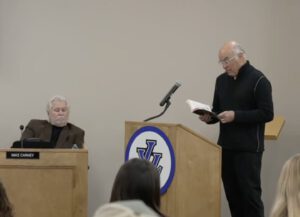Kansas State Board of Education to ‘take a serious look’ at cellphone ban
Restricting cellphone use in Kansas public schools is on the table now that the state board of education is forming a “blue-ribbon task force” to examine the issue.
The Kansas State Board of…

Restricting cellphone use in Kansas public schools is on the table now that the state board of education is forming a “blue-ribbon task force” to examine the issue.
The Kansas State Board of Education expects the task force to provide policy recommendations sometime this fall.
The group will reportedly have 30 members including students, teachers, administrators and “other education representatives.” Additionally, there will be at least two board members.
While students told 12 News, the local CW affiliate in Wichita, they understood the reasoning behind a potential cellphone ban, they also expressed safety concerns.
“Each year [cellphone use] kind of gets a little worse, especially when there’s no restrictions at all,” Derby High School student Morgan Thompson admitted before expressing his concerns.
“At my high school, we had a power outage and kids were just everywhere. And, so I think phones are good to call parents, let them know where you’re at, that you’re safe. Like if there was a school shooter or something like that.”
“With the rise in school shootings, I don’t feel like … restricting phones is the safest option for a lot of students,” Savannah Smith, a Newton High School student said in agreement.
But Smith also noted such restrictions could be beneficial in some instances, even though she doubts their effectiveness.
“Lots of online bullying does go on during the school day, so I feel like if they restricted it, it would slow that down a little.
“It’s still going to happen. Kids don’t pay attention, obviously because of their phones. We find loopholes. Even if they take our phones, people are still going to have backup phones, they’re going to use their computers. We will always find a way around it.”
Kathyrene Hayes, an educator in the Kansas City metropolitan area for the last 20 years, has seen it all when it comes to student cellphone usage.
“I think if you ban cellphone usage in the classroom, student engagement will increase,” she told The Lion.
“I understand the need to have a cellphone in case of an emergency, like for example a school shooting. However, sometimes students receive text messages from parents regarding someone dying or being rushed to the hospital. This type of message starts students to panic, scream, cry, or yell and we cannot get them to calm down.
“Also, students are video recording their teachers and this is an invasion of privacy.”
Ultimately, Hayes recommends a measured approach, considering all the potential problems and benefits.
“Everyone needs to be careful when using a cellphone. It can be a dangerous thing or it may even save a life during a state of emergency. States should weigh the pros and cons before banning cellphone usage in the classroom. They should also survey stakeholders to gather feedback before deciding whether to ban.”
Citing uncertainty about the impact of cellphone usage on academic achievement, Kansas Education Commissioner Dr. Randy Watson said he thinks it’s time the state finds some answers and formulates appropriate policies.
“We’re unsure right now what direct impact the nonacademic use of technology in the classroom is having on learning – but it’s worth exploring,” he wrote in a statement.
“Officials at a charter school in the greater Kansas City area curtailed the use of students’ cellphones and scores on state assessments improved in English and math in 2023. According to the National Center for Education Statistics, 77% of schools have a policy prohibiting cellphones for nonacademic use. However, according to a study from Common Sense Media, 97% of students use their phones during the school day.”
Watson also pointed out that today’s cellphones are used for much more than making calls.
“For me, ‘cellphone’ is a misnomer. It’s rarely used to call people. In my generation, when we hear the word ‘phone,’ we think of talking on a device. For more than 100 years, that’s what we used it for. But these devices aren’t being used to call your friend or call home but rather to access a variety of information, videos and social media. They’re actually a smart computer device and it’s in the hands of every kid.
“It’s time we take a serious look on the use of cellphones and social media in schools here in Kansas. Up until the past 15 years or so, we have witnessed what has been a fairly slow evolution of the phone. However, technology is changing our phones so fast, we don’t really know what the consequences will ultimately be.
“I think everyone is recognizing the harmful effects smart phones are having on our children. The question is, what are we as parents, educators and elected officials willing to do about it? I’m hoping we will start to find some answers soon.”



